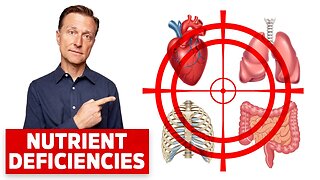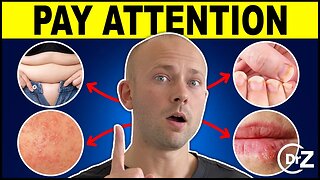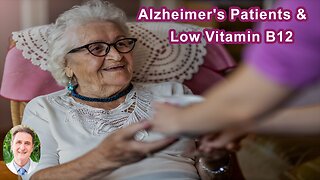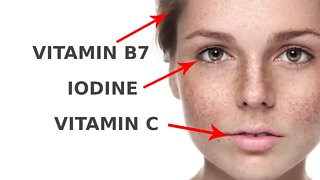The Most Common Nutrient Deficiency in the Elderly
The older you get, the fewer nutrients you can absorb. Here’s what you need to know about the top vitamin deficiencies in the elderly.
Vitamin B1:
https://youtu.be/mk2QMLT4CNU
https://youtu.be/cJ6MIiPyXZY
https://youtu.be/5M5xP_Sv4xQ
Check out Dr. Berg’s Nutritional Yeast Tablets: 🛒 https://drbrg.co/3CcRZ3s
Check out Dr. Berg’s Cod Liver Oil: 🛒https://drbrg.co/3X3URt7
Check out Dr. Berg’s Trace Minerals: 🛒 https://drbrg.co/3CaBmFr
Timestamps
0:00 Nutritional deficiencies and the elderly
0:10 Tea and toast syndrome
0:40 Causes of nutritional deficiencies in the elderly
1:50 Top nutritional deficiencies in the elderly
Today I want to cover the top nutritional deficiencies in the elderly. This is actually a big problem.
There is even something called “tea and toast syndrome,” which develops over time as a person’s diet degenerates into things like bread, crackers, and even canned meats. A lot of deficiencies can be created from this type of diet. Typical foods served in nursing homes, such as many cooked foods, sugary foods, low-quality foods, and snacks, can also lead to deficiencies.
A lot of the elderly also take synthetic vitamins. The first ingredient in a lot of synthetic vitamins is calcium carbonate, which can be a problem. Medications are another thing that can also deplete vitamins.
The older you get, the less stomach acid you’re going to have. This means that you’re not going to be able to digest protein or pull in the amino acids, which are needed to help repair and heal the body. In this situation, it will also be harder to absorb vitamin B12, which can create a range of issues.
Top nutritional deficiencies in the elderly:
1. Vitamin D
2. Vitamin B1
3. Potassium
4. Magnesium
5. Sodium
6. Trace minerals (especially zinc)
Dr. Eric Berg DC Bio:
Dr. Berg, age 58, is a chiropractor who specializes in Healthy Ketosis & Intermittent Fasting. He is the author of the best-selling book The Healthy Keto Plan, and is the Director of Dr. Berg Nutritionals. He no longer practices, but focuses on health education through social media.
DR. BERG'S SHOP: https://bit.ly/3dXva6Y
Follow us on FACEBOOK: fb.me/DrEricBerg
Send a Message to his team: m.me/DrEricBerg
ABOUT DR. BERG: https://bit.ly/2Hza8PT
Disclaimer:
Dr. Eric Berg received his Doctor of Chiropractic degree from Palmer College of Chiropractic in 1988. His use of “doctor” or “Dr.” in relation to himself solely refers to that degree. Dr. Berg is a licensed chiropractor in Virginia, California, and Louisiana, but he no longer practices chiropractic in any state and does not see patients so he can focus on educating people as a full time activity, yet he maintains an active license. This video is for general informational purposes only. It should not be used to self-diagnose and it is not a substitute for a medical exam, cure, treatment, diagnosis, and prescription or recommendation. It does not create a doctor-patient relationship between Dr. Berg and you. You should not make any change in your health regimen or diet before first consulting a physician and obtaining a medical exam, diagnosis, and recommendation. Always seek the advice of a physician or other qualified health provider with any questions you may have regarding a medical condition.
#keto #ketodiet #weightloss
Thanks for watching! I hope this helps you better understand the top nutritional deficiencies in the elderly.
-
 14:12
14:12
Dr. Eric Berg
1 year agoTop Diseases That Are REALLY Nutrient Deficiencies
57 -
 6:27
6:27
Dr. Nick Zyrowski
6 months ago5 Common Nutrient Deficiencies In Modern People
6976 -
 0:59
0:59
kamphang
1 year agoNutrition Problems in the Elderly.
3 -
 23:51
23:51
joegecko's Proxy Channel
1 year ago23 Signs Your Body Is Deficient in Nutrients
181 -
 6:41
6:41
TheRealTruthAboutHealth
10 months agoPeople With Alzheimer's Disease Were 4 Times As Likely To Have Low Vitamin B12
1.93K -
 16:23
16:23
Dr. John Campbell
10 months agoCommon deficiency and dementia
22.2K100 -
![Vitamin B1 (Thiamine) Deficiency- The 'Great Imitator' of other Illnesses [Mirrored]](https://hugh.cdn.rumble.cloud/s/fw/s8/6/C/z/U/c/CzUci.0kob.jpg) 16:33
16:33
Do Not Be Deceived
1 year agoVitamin B1 (Thiamine) Deficiency- The 'Great Imitator' of other Illnesses [Mirrored]
2383 -
 3:27
3:27
Natural Cures
7 years ago5 Vitamin Deficiencies That Show Up in Your Face
47 -
 7:50
7:50
droteng
1 year agoHow to Know You are Deficient or Low in Vitamin D #droteng
43 -
 2:22
2:22
Natural Cures
1 year ago $0.02 earnedThe Lack Of This Vitamin Is Responsible For A Range Of Health Problems
222